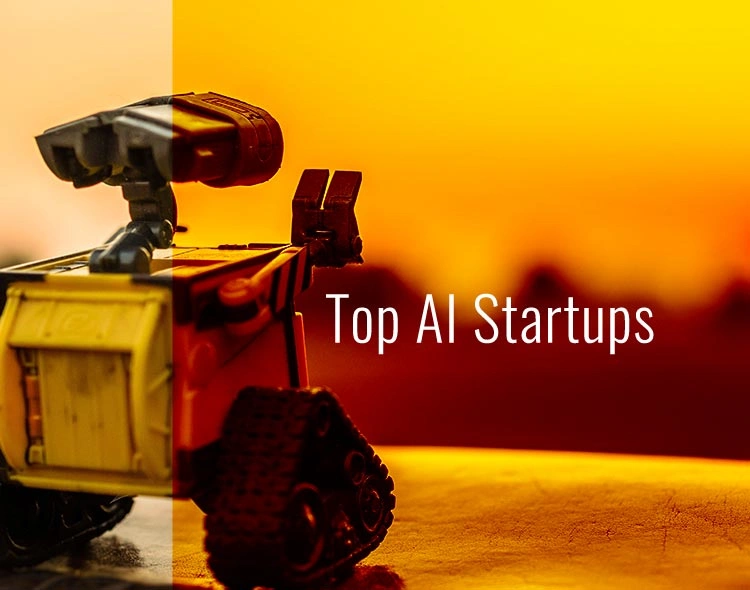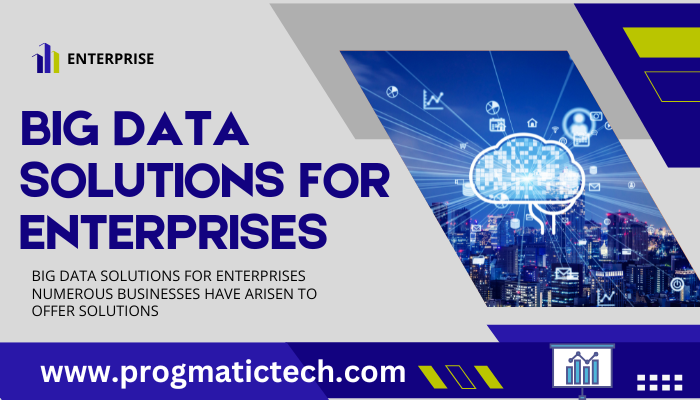In the tech and commercial worlds, the phrase big data is used quite a bit. To put it simply, it's the process of gathering very big, complicated data sets from several sources and examining them to identify trends and issues in order to derive useful information. Big data is really important, but it's also too much for typical software to manage. This is where experts step in to help sort it all out. Big data solutions for enterprises numerous businesses have arisen to offer solutions for organizing large datasets and deciphering the pertinent information contained within.
While some combine and arrange datasets into charts, graphs, and other data visualization forms, others include robust data analysis capabilities. The firms listed below all use big data in one way or another to help other organizations better understand their operations and adopt innovative approaches to problem-solving.
Top 15 Big Data Solutions For Enterprises
What is meant by big data?
Organizations gather, examine, and mine big data—a mix of structured, semi-structured, and unstructured data—to get knowledge and insights.
It is employed in predictive modeling, machine learning initiatives, and other cutting-edge analytics uses. Big data processing and storage systems are already a standard part of data management infrastructures in businesses.
They are paired with technologies that facilitate the application of big data analytics. The three V's are frequently used to describe big data:
- the substantial amount of data in several settings.
- the large range of data types that big data systems commonly hold.
- the rapidity of data generation, collection, and processing.
In 2001, while working as an analyst at the consulting firm Meta Group Inc., Doug Laney made the initial identification of these three V's of big data. Following its 2005 acquisition of Meta Group, Gartner made them well known. Veracity, value, and variability are some additional V's that have been added to various definitions of big data in recent years.
How is big data used, and why is it important?
Businesses utilize big data in their systems to enhance customer service, boost operational effectiveness, develop tailored marketing campaigns, and take other steps that can boost sales and profitability. Because they can make choices more quickly and intelligently, companies that successfully use big data may have a competitive edge over those that don't.
Big data, for instance, gives businesses insightful information about their clients that they can utilize to improve their marketing, promotions, and advertising in order to boost customer engagement and conversion rates.
Businesses may become more responsive to the requirements and desires of their customers by analyzing both historical and current data to evaluate how consumer or corporate purchasers' preferences are changing.
Read also: Benefits Of Hybrid Cloud Services For Enterprise
Benefits of big data
Correct usage and management of massive data quantities may help organizations in a number of ways, including the following:
- More effective decision-making: Big data may provide a business with valuable insights, dangers, patterns, or trends. Large data sets are intended to be thorough and contain all the information required by the company to make better judgments. Business executives may swiftly make data-driven choices that affect their companies with the use of big data analytics.
- Better market and consumer insights: Big data covering consumer behavior and market trends provides an organization with critical insights to address the needs of its target consumers. This kind of understanding is very helpful when making judgments about product development.
- Cost savings: Businesses may utilize big data to identify areas where they might improve operational efficiency. Big data research on a company's energy consumption, for instance, may make it more efficient.
- Favorable social impact: Big data may be used to find problems that can be solved, such as addressing poverty in a particular area or enhancing healthcare.
Challenges with big data
When working with huge data, data specialists frequently face certain difficulties. Among them are the following:
- Design for architecture: Users frequently struggle with designing a big data architecture that takes into account an organization's processing capabilities. Big data solutions need to be customized to meet the unique requirements of each enterprise. IT and data management teams must assemble a specialized set of tools and technologies for these kinds of initiatives, which are frequently do-it-yourself endeavors.
- Skill requirements: In addition, the abilities that database administrators and developers who specialize in relational software usually possess are not applicable to the deployment and management of big data systems.
- Costs: A managed cloud service can assist in controlling expenses. To ensure that expenses don't spiral out of control, IT administrators must continue to closely monitor cloud computing usage.
- Migration: Moving processing workloads and on-premises data sets to the cloud can be challenging.
- Accessibility: Making the data available to data scientists and analysts is one of the biggest issues in managing big data systems, particularly in remote contexts with a variety of platforms and data repositories. Data management and analytics teams are increasingly creating data catalogs that include metadata management and data lineage capabilities to assist analysts in finding pertinent data.
1. Self-service data

Data self-service solutions are one example of the kind of technology that tends to develop exponentially when it simplifies the procedures of data preparation, exploration, and purification.
Its objective is to enable decision-makers and business teams at all levels to use the data at their disposal to do their duties efficiently.
Read also: Enterprise Software Solutions Development Company
2. The cloud
The benefits of cloud big data solutions are numerous. Their use is most prominent in the Internet of Things (IoT). Nothing compares to cloud services for managing the massive amounts of data that are exchanged during the creation and execution of Internet of Things applications, which need precise and scalable solutions.
3. Integration of Data
Tools that enable data orchestration, such as Apache Hive, Apache Pig, Hadoop, Couchbase, MongoDB, Apache Spark, and Amazon Elastic Map Reduce (EMR), are necessary for data integration.
4. The data lake
All data forms, whether structured, unstructured, or semi-structured, are kept in a data lake. From creating visualization dashboards to transforming real-time data for agile business applications, data may be stored before it is converted, enabling manipulation and analysis.
Because they can conduct a variety of studies using log files, social media data, and click-streaming, businesses that utilize data lakes in their daily operations are able to maintain an advantage over their rivals. It's a big data solution that lets contemporary firms make daily decisions more quickly and react better to possibilities.
5. Kubernetes

One of Google's open-source big data technologies, Kubernetes, is capable of container orchestration. Furthermore, it provides you with the flexibility of a platform that allows you to scale, automate, deploy, and execute container systems on your own local cluster.
6. Docker
Docker is a big data solution that makes it easier to create, launch, and run container apps. Stated differently, its cross-platform functionality enables the management of containers across many operating systems.
It's the best substitute for launching all the programs you want with the least amount of resource use due to its compartmentalized view of operating systems, which enables you to containerize apps, distribute them, scale them, and operate them rapidly.
7. Analytics for streams
Using continuous queries termed event streams, streaming analytics, sometimes referred to as event stream processing, analyzes massive data pools that are continuously moving and updated in real time.
You may obtain nearly instantaneous responses and find hidden patterns, correlations, and other insights via stream analytics. This technology allows for a variety of agile activities, such as upselling and cross-selling to customers based on the information presented.
8. The Hadoop Environment
The Hadoop framework is made to quickly and affordably store and analyze data across several servers. This tool's usage of a straightforward programming model in a distributed data processing environment makes this feasible.
It's crucial to keep in mind that companies have long adopted Hadoop as a big data tool. Additionally, Hadoop is still expanding, so businesses that begin investigating it now will probably rapidly realize its benefits and uses.
9. NoSQL database
The rise of NoSQL databases is exponential when compared to relational databases (RDBMS). A dynamic schema design, increased customization possibilities, flexibility, and scalability are all provided by this kind of database, which is crucial for large data storage.
Read also: Enterprise Data Management Services
10. Analytics that predict

This technology allows you to forecast the future, depict the present, and draw lessons from the past. Using artificial intelligence and machine learning based on large data sources, it assists in the discovery, assessment, optimization, and implementation of prediction models. Enhancing corporate performance, lowering risks, and gaining a significant competitive edge are all achievable with this.
11. Anthology AI
AnthologyAI functions as a two-way marketplace for data. Customers may safely manage and profit from AnthologyAI's access to their personal data using its mobile app.
Businesses may use the company's intelligent knowledge graph—a collection of consumer behavioral data collected with the express agreement of AnthologyAI users—through a series of products and solutions.
12. Sisense
AI and machine learning are used by the global analytics platform Sisense to provide insights that inform important business choices.
Clients may create, utilize, and integrate their own personalized dashboards using its interface. Since its founding in Israel in 2004, Sisense has assisted start-ups and some of the biggest corporations in the world in integrating analytics into their applications and turning data into profits.
13. DISQO
DISQO collaborates with market researchers, publishers, agencies, and brands to offer audience data gleaned via transparent and open sharing.
The platform tracks consumer behavioral data and brand insights online through managed services and API connections. It goes beyond surveys to explore the major determinants of purchase and search activity across demographics and channels.
14. Fivetran
For a more effective data analysis procedure, Fivetran automates data integration from source to destination. Pre-built connections, incremental batch updates, SQL-based transformations, and ready-to-query schemas are just a few of the features that help data teams save time and money.
Among the many well-known businesses that utilize Fivetran to automate and manage their big data connections are Square and DocuSign.
Read also: What Can Enterprise Learning Do for Your Business?
15. Alteryx

Alteryx is an analytics platform that provides business analysts and data scientists with comprehensive solutions. Several teams can collaborate to uncover answers in their data thanks to the technology. Alteryx collaborates with top systems integrators, developers, and analytics specialists to help and teach its clients and improve business results.
conclusion
Big data solutions get crucial resources for company executives looking to maintain their competitiveness in a data-driven environment. Utilizing AI, machine learning, and advanced analytics, companies can provide individualized client experiences, streamline processes, and unearth important insights.
Businesses can innovate and adjust to shifting market conditions with the help of big data, which may improve decision-making and supply chain efficiency. Strategic planning, a strong infrastructure, and an emphasis on data security are necessary for putting these ideas into practice.
Big data solutions have the power to turn obstacles into opportunities when properly implemented, spurring expansion and giving businesses a long-term advantage in the fast-paced commercial world of today.
FAQ's: Big Data Solutions For Enterprises
What are the big data solutions?
Big Data visualization and analysis are made possible by artificial intelligence, machine learning, and contemporary database technologies, which provide real-time actionable insights. Big Data analytics assist businesses in putting their data to use by creating business models and realizing new prospects.
What is the role of big data in enterprises?
Big data analytics assists businesses in utilizing their data to find new possibilities. This ultimately results in better company decisions, more effective operations, increased revenue, and satisfied clients. Companies may benefit from using big data and advanced analytics in a variety of ways, including cost reduction.
What are the 7 pillars of big data?
Value is the ultimate goal. After spending a great deal of time, energy, and money on volume, velocity, variety, variability, truthfulness, and visualization, you want to make sure your company is benefiting from the data.
How can businesses use big data?
With foot traffic or other consumer behavior patterns, big data, for instance, might assist a business in determining the ideal time of day or place to post signs. Therefore, businesses may increase sales by ensuring that their services appear in the most popular locations and during the busiest periods.






